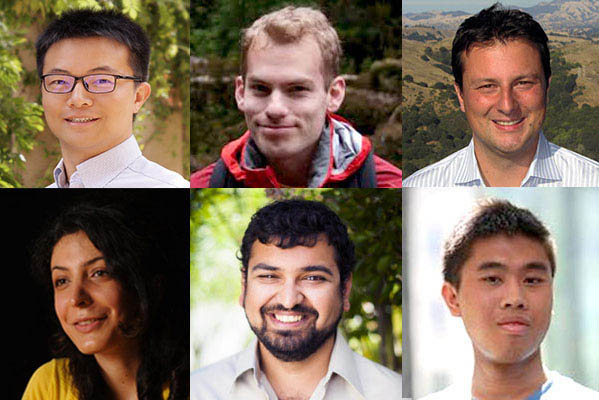
Top row, L to R: Han, Isola, Kraska. Bottom row, L to R: Niroui, Satyanarayan, Shun.
School of Engineering
The School of Engineering will welcome 16 new faculty members to its departments, institutes, labs, and centers for the 2017-2018 and 2018-2019 academic years. Among them are six faculty members in EECS:
Song Han will join EECS as an assistant professor in July 2018. He received his master’s degree and PhD in electrical engineering from Stanford. His research focuses on energy-efficient deep learning at the intersection of machine learning and computer architecture. Han proposed the deep compression algorithm, which can compress neural networks by 17 to 49 times while fully preserving prediction accuracy. He also designed the first hardware accelerator that can perform inference directly on a compressed sparse model, which results in significant speed increases and energy saving. His work has been featured by O’Reilly, TechEmergence, and The Next Platform, among others. Han has won best-paper awards at the International Conference on Learning Representations and the International Symposium on Field-Programmable Gate Arrays.
Phillip Isola will join EECS as an assistant professor in July 2018. He received a bachelor’s degree in computer science from Yale University and a PhD in brain and cognitive sciences from MIT. Currently a fellow at OpenAI, Isola studies visual intelligence from the perspective of both minds and machines. He received a National Science Foundation (NSF) graduate fellowship as well as an NSF postdoctoral fellowship.
Tim Kraska will join EECS as an associate professor in January 2018. Currently an assistant professor of computer science at Brown University, Kraska received a PhD from ETH Zurich, then spent three years as a postdoc in the AMPLab at the University of California at Berkeley, where he worked on hybrid human-machine database systems and cloud-scale data management systems. He focuses on building systems for interactive data exploration, machine learning, and transactional systems for modern hardware, especially the next generation of networks. Kraska was recently selected as a 2017 Alfred P. Sloan Research Fellow in computer science. He has also received an NSF CAREER Award, an Air Force young investigator award, two Very Large Data Bases conference best-demo awards, and a best-paper award from the IEEE International Conference on Data Engineering.
Farnaz Niroui will join EECS as an assistant professor in January 2019. She received her PhD and master’s degrees in electrical engineering from MIT and a bachelor’s degree in nanotechnology engineering from the University of Waterloo. She is currently a Miller Postdoctoral Fellow at the University of California at Berkeley. Her research integrates electrical engineering with materials science and chemistry to develop hybrid nanofabrication techniques to enable precise yet scalable processing of nanoscale architectures capable of uniquely controlling light-matter interactions, electronic transport, and exciton dynamics to engineer new paradigms of active nanoscale devices. During her graduate studies, Niroui was a recipient of the Engineering Research Council of Canada scholarship, and she was selected for the Rising Stars program in EECS at MIT in 2015 and in 2016 at Carnegie Mellon University.
Arvind Satyanarayan will join EECS as an assistant professor in July 2018. He received a bachelor’s degree from the University of California at San Diego and a master’s degree from Stanford — both in computer science — and a PhD in computer science from Stanford, working with the University of Washington Interactive Data Lab. Satyanarayan is currently a postdoc at Google Brain, working on improving the interpretability of deep-learning models through visualization. He focuses on developing new declarative languages for interactive visualization and leveraging them in new systems for visualization design and data analysis. His work has also been deployed on Wikipedia to enable interactive visualizations within articles. Satyanarayan’s research has been recognized with a Google PhD fellowship and best-paper awards at the IEEE InfoVis and the Association for Computing Machinery (ACM) Computer-Human Interaction conference.
Julian Shun joined EECS as an assistant professor in September 2017. He received a bachelor’s degree in computer science from the University of California at Berkeley, and a PhD in computer science from Carnegie Mellon University (CMU). Before coming to MIT, he was a postdoctoral Miller Research Fellow at UC Berkeley. Shun’s research focuses on the theory and practice of parallel algorithms and programming. He is particularly interested in designing algorithms and frameworks for large-scale graph analytics. He is also interested in parallel algorithms for text analytics, concurrent data structures, and methods for deterministic parallelism. Shun received the ACM doctoral dissertation award, the CMU School of Computer Science doctoral dissertation award, a Facebook graduate fellowship, and a best-student-paper award at the Data Compression Conference.
"I am pleased to welcome our exceptional new faculty. Their presence will enhance the breadth and depth of education and research within the School of Engineering, and strengthen MIT’s commitment to making a better world,” says Anantha Chandrakasan, dean of the School of Engineering. “I look forward to their contributions in the years to come.
For more on the appointments, including a list of new faculty in other School of Engineering Departments, visit the MIT News website.
Date Posted:
Card Title Color:
Card Description:
Photo:

Card Wide Image:
